The Neoliberal and Socialist Approaches to Health and Social Policy
VerifiedAdded on 2023/01/11
|9
|1393
|73
AI Summary
This assignment explores the advantages and disadvantages of the neoliberal and socialist approaches to health and social policy.
Contribute Materials
Your contribution can guide someone’s learning journey. Share your
documents today.

The Neoliberal and
Socialist
Socialist
Secure Best Marks with AI Grader
Need help grading? Try our AI Grader for instant feedback on your assignments.
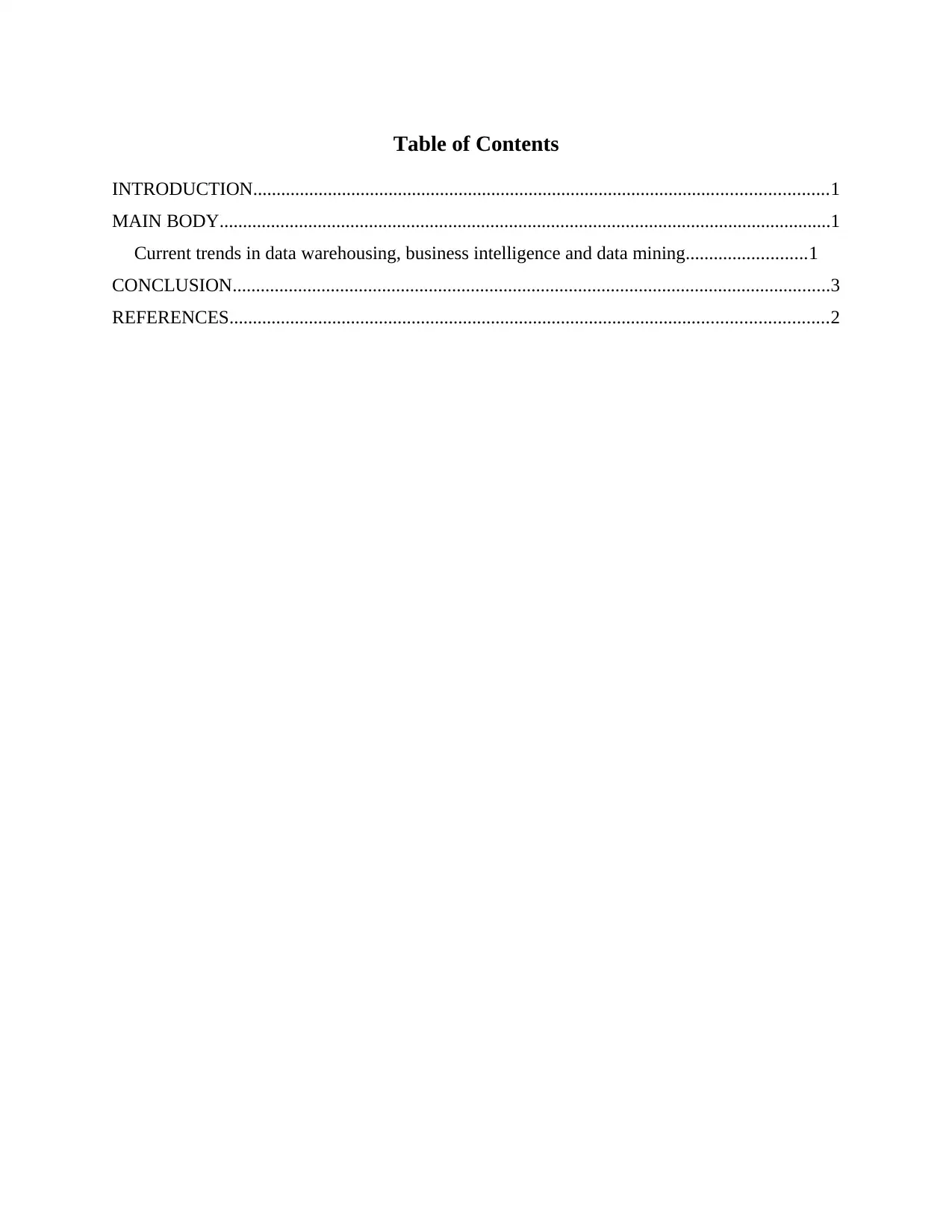
Table of Contents
INTRODUCTION...........................................................................................................................1
MAIN BODY...................................................................................................................................1
Current trends in data warehousing, business intelligence and data mining..........................1
CONCLUSION................................................................................................................................3
REFERENCES................................................................................................................................2
INTRODUCTION...........................................................................................................................1
MAIN BODY...................................................................................................................................1
Current trends in data warehousing, business intelligence and data mining..........................1
CONCLUSION................................................................................................................................3
REFERENCES................................................................................................................................2
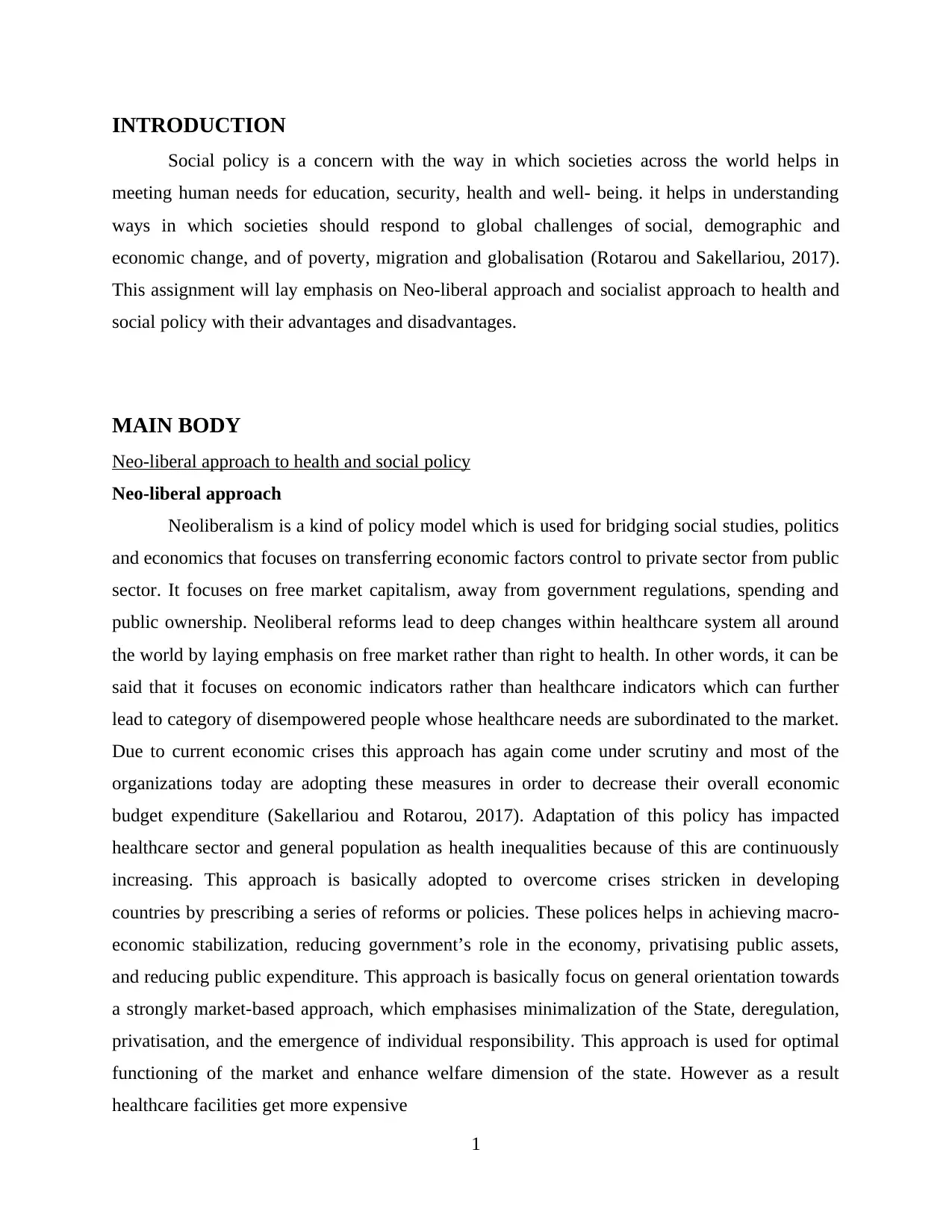
INTRODUCTION
Social policy is a concern with the way in which societies across the world helps in
meeting human needs for education, security, health and well- being. it helps in understanding
ways in which societies should respond to global challenges of social, demographic and
economic change, and of poverty, migration and globalisation (Rotarou and Sakellariou, 2017).
This assignment will lay emphasis on Neo-liberal approach and socialist approach to health and
social policy with their advantages and disadvantages.
MAIN BODY
Neo-liberal approach to health and social policy
Neo-liberal approach
Neoliberalism is a kind of policy model which is used for bridging social studies, politics
and economics that focuses on transferring economic factors control to private sector from public
sector. It focuses on free market capitalism, away from government regulations, spending and
public ownership. Neoliberal reforms lead to deep changes within healthcare system all around
the world by laying emphasis on free market rather than right to health. In other words, it can be
said that it focuses on economic indicators rather than healthcare indicators which can further
lead to category of disempowered people whose healthcare needs are subordinated to the market.
Due to current economic crises this approach has again come under scrutiny and most of the
organizations today are adopting these measures in order to decrease their overall economic
budget expenditure (Sakellariou and Rotarou, 2017). Adaptation of this policy has impacted
healthcare sector and general population as health inequalities because of this are continuously
increasing. This approach is basically adopted to overcome crises stricken in developing
countries by prescribing a series of reforms or policies. These polices helps in achieving macro-
economic stabilization, reducing government’s role in the economy, privatising public assets,
and reducing public expenditure. This approach is basically focus on general orientation towards
a strongly market-based approach, which emphasises minimalization of the State, deregulation,
privatisation, and the emergence of individual responsibility. This approach is used for optimal
functioning of the market and enhance welfare dimension of the state. However as a result
healthcare facilities get more expensive
1
Social policy is a concern with the way in which societies across the world helps in
meeting human needs for education, security, health and well- being. it helps in understanding
ways in which societies should respond to global challenges of social, demographic and
economic change, and of poverty, migration and globalisation (Rotarou and Sakellariou, 2017).
This assignment will lay emphasis on Neo-liberal approach and socialist approach to health and
social policy with their advantages and disadvantages.
MAIN BODY
Neo-liberal approach to health and social policy
Neo-liberal approach
Neoliberalism is a kind of policy model which is used for bridging social studies, politics
and economics that focuses on transferring economic factors control to private sector from public
sector. It focuses on free market capitalism, away from government regulations, spending and
public ownership. Neoliberal reforms lead to deep changes within healthcare system all around
the world by laying emphasis on free market rather than right to health. In other words, it can be
said that it focuses on economic indicators rather than healthcare indicators which can further
lead to category of disempowered people whose healthcare needs are subordinated to the market.
Due to current economic crises this approach has again come under scrutiny and most of the
organizations today are adopting these measures in order to decrease their overall economic
budget expenditure (Sakellariou and Rotarou, 2017). Adaptation of this policy has impacted
healthcare sector and general population as health inequalities because of this are continuously
increasing. This approach is basically adopted to overcome crises stricken in developing
countries by prescribing a series of reforms or policies. These polices helps in achieving macro-
economic stabilization, reducing government’s role in the economy, privatising public assets,
and reducing public expenditure. This approach is basically focus on general orientation towards
a strongly market-based approach, which emphasises minimalization of the State, deregulation,
privatisation, and the emergence of individual responsibility. This approach is used for optimal
functioning of the market and enhance welfare dimension of the state. However as a result
healthcare facilities get more expensive
1
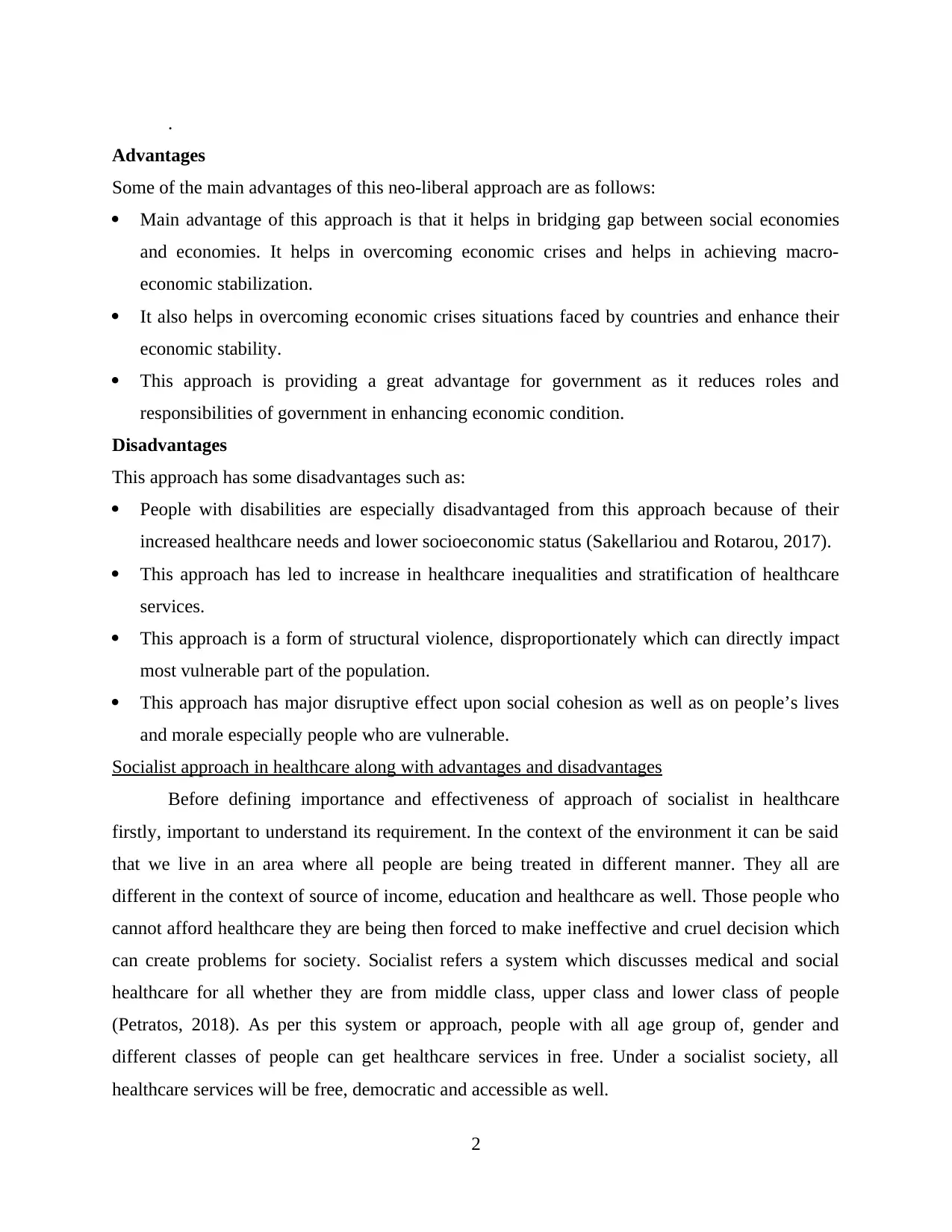
.
Advantages
Some of the main advantages of this neo-liberal approach are as follows:
Main advantage of this approach is that it helps in bridging gap between social economies
and economies. It helps in overcoming economic crises and helps in achieving macro-
economic stabilization.
It also helps in overcoming economic crises situations faced by countries and enhance their
economic stability.
This approach is providing a great advantage for government as it reduces roles and
responsibilities of government in enhancing economic condition.
Disadvantages
This approach has some disadvantages such as:
People with disabilities are especially disadvantaged from this approach because of their
increased healthcare needs and lower socioeconomic status (Sakellariou and Rotarou, 2017).
This approach has led to increase in healthcare inequalities and stratification of healthcare
services.
This approach is a form of structural violence, disproportionately which can directly impact
most vulnerable part of the population.
This approach has major disruptive effect upon social cohesion as well as on people’s lives
and morale especially people who are vulnerable.
Socialist approach in healthcare along with advantages and disadvantages
Before defining importance and effectiveness of approach of socialist in healthcare
firstly, important to understand its requirement. In the context of the environment it can be said
that we live in an area where all people are being treated in different manner. They all are
different in the context of source of income, education and healthcare as well. Those people who
cannot afford healthcare they are being then forced to make ineffective and cruel decision which
can create problems for society. Socialist refers a system which discusses medical and social
healthcare for all whether they are from middle class, upper class and lower class of people
(Petratos, 2018). As per this system or approach, people with all age group of, gender and
different classes of people can get healthcare services in free. Under a socialist society, all
healthcare services will be free, democratic and accessible as well.
2
Advantages
Some of the main advantages of this neo-liberal approach are as follows:
Main advantage of this approach is that it helps in bridging gap between social economies
and economies. It helps in overcoming economic crises and helps in achieving macro-
economic stabilization.
It also helps in overcoming economic crises situations faced by countries and enhance their
economic stability.
This approach is providing a great advantage for government as it reduces roles and
responsibilities of government in enhancing economic condition.
Disadvantages
This approach has some disadvantages such as:
People with disabilities are especially disadvantaged from this approach because of their
increased healthcare needs and lower socioeconomic status (Sakellariou and Rotarou, 2017).
This approach has led to increase in healthcare inequalities and stratification of healthcare
services.
This approach is a form of structural violence, disproportionately which can directly impact
most vulnerable part of the population.
This approach has major disruptive effect upon social cohesion as well as on people’s lives
and morale especially people who are vulnerable.
Socialist approach in healthcare along with advantages and disadvantages
Before defining importance and effectiveness of approach of socialist in healthcare
firstly, important to understand its requirement. In the context of the environment it can be said
that we live in an area where all people are being treated in different manner. They all are
different in the context of source of income, education and healthcare as well. Those people who
cannot afford healthcare they are being then forced to make ineffective and cruel decision which
can create problems for society. Socialist refers a system which discusses medical and social
healthcare for all whether they are from middle class, upper class and lower class of people
(Petratos, 2018). As per this system or approach, people with all age group of, gender and
different classes of people can get healthcare services in free. Under a socialist society, all
healthcare services will be free, democratic and accessible as well.
2
Secure Best Marks with AI Grader
Need help grading? Try our AI Grader for instant feedback on your assignments.
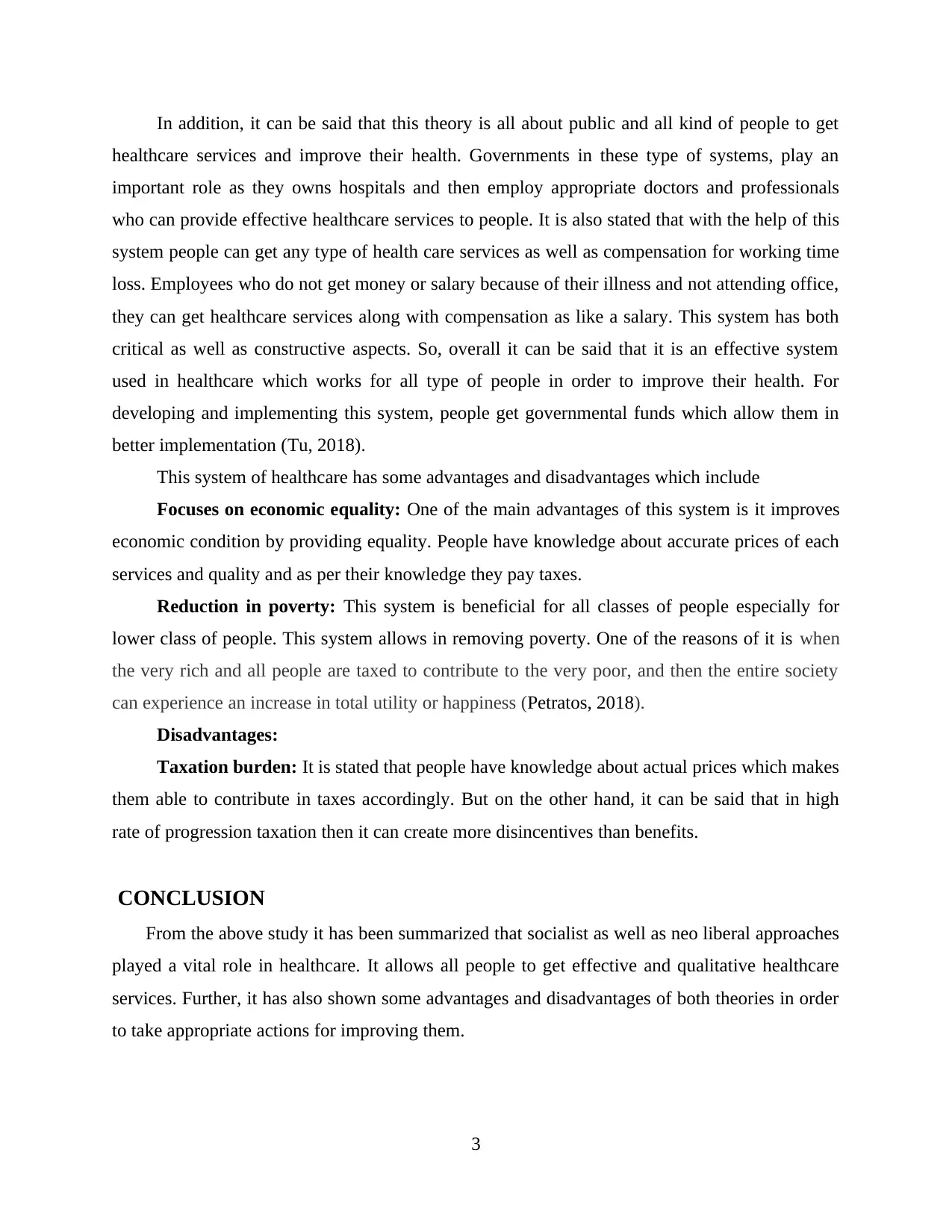
In addition, it can be said that this theory is all about public and all kind of people to get
healthcare services and improve their health. Governments in these type of systems, play an
important role as they owns hospitals and then employ appropriate doctors and professionals
who can provide effective healthcare services to people. It is also stated that with the help of this
system people can get any type of health care services as well as compensation for working time
loss. Employees who do not get money or salary because of their illness and not attending office,
they can get healthcare services along with compensation as like a salary. This system has both
critical as well as constructive aspects. So, overall it can be said that it is an effective system
used in healthcare which works for all type of people in order to improve their health. For
developing and implementing this system, people get governmental funds which allow them in
better implementation (Tu, 2018).
This system of healthcare has some advantages and disadvantages which include
Focuses on economic equality: One of the main advantages of this system is it improves
economic condition by providing equality. People have knowledge about accurate prices of each
services and quality and as per their knowledge they pay taxes.
Reduction in poverty: This system is beneficial for all classes of people especially for
lower class of people. This system allows in removing poverty. One of the reasons of it is when
the very rich and all people are taxed to contribute to the very poor, and then the entire society
can experience an increase in total utility or happiness (Petratos, 2018).
Disadvantages:
Taxation burden: It is stated that people have knowledge about actual prices which makes
them able to contribute in taxes accordingly. But on the other hand, it can be said that in high
rate of progression taxation then it can create more disincentives than benefits.
CONCLUSION
From the above study it has been summarized that socialist as well as neo liberal approaches
played a vital role in healthcare. It allows all people to get effective and qualitative healthcare
services. Further, it has also shown some advantages and disadvantages of both theories in order
to take appropriate actions for improving them.
3
healthcare services and improve their health. Governments in these type of systems, play an
important role as they owns hospitals and then employ appropriate doctors and professionals
who can provide effective healthcare services to people. It is also stated that with the help of this
system people can get any type of health care services as well as compensation for working time
loss. Employees who do not get money or salary because of their illness and not attending office,
they can get healthcare services along with compensation as like a salary. This system has both
critical as well as constructive aspects. So, overall it can be said that it is an effective system
used in healthcare which works for all type of people in order to improve their health. For
developing and implementing this system, people get governmental funds which allow them in
better implementation (Tu, 2018).
This system of healthcare has some advantages and disadvantages which include
Focuses on economic equality: One of the main advantages of this system is it improves
economic condition by providing equality. People have knowledge about accurate prices of each
services and quality and as per their knowledge they pay taxes.
Reduction in poverty: This system is beneficial for all classes of people especially for
lower class of people. This system allows in removing poverty. One of the reasons of it is when
the very rich and all people are taxed to contribute to the very poor, and then the entire society
can experience an increase in total utility or happiness (Petratos, 2018).
Disadvantages:
Taxation burden: It is stated that people have knowledge about actual prices which makes
them able to contribute in taxes accordingly. But on the other hand, it can be said that in high
rate of progression taxation then it can create more disincentives than benefits.
CONCLUSION
From the above study it has been summarized that socialist as well as neo liberal approaches
played a vital role in healthcare. It allows all people to get effective and qualitative healthcare
services. Further, it has also shown some advantages and disadvantages of both theories in order
to take appropriate actions for improving them.
3

4
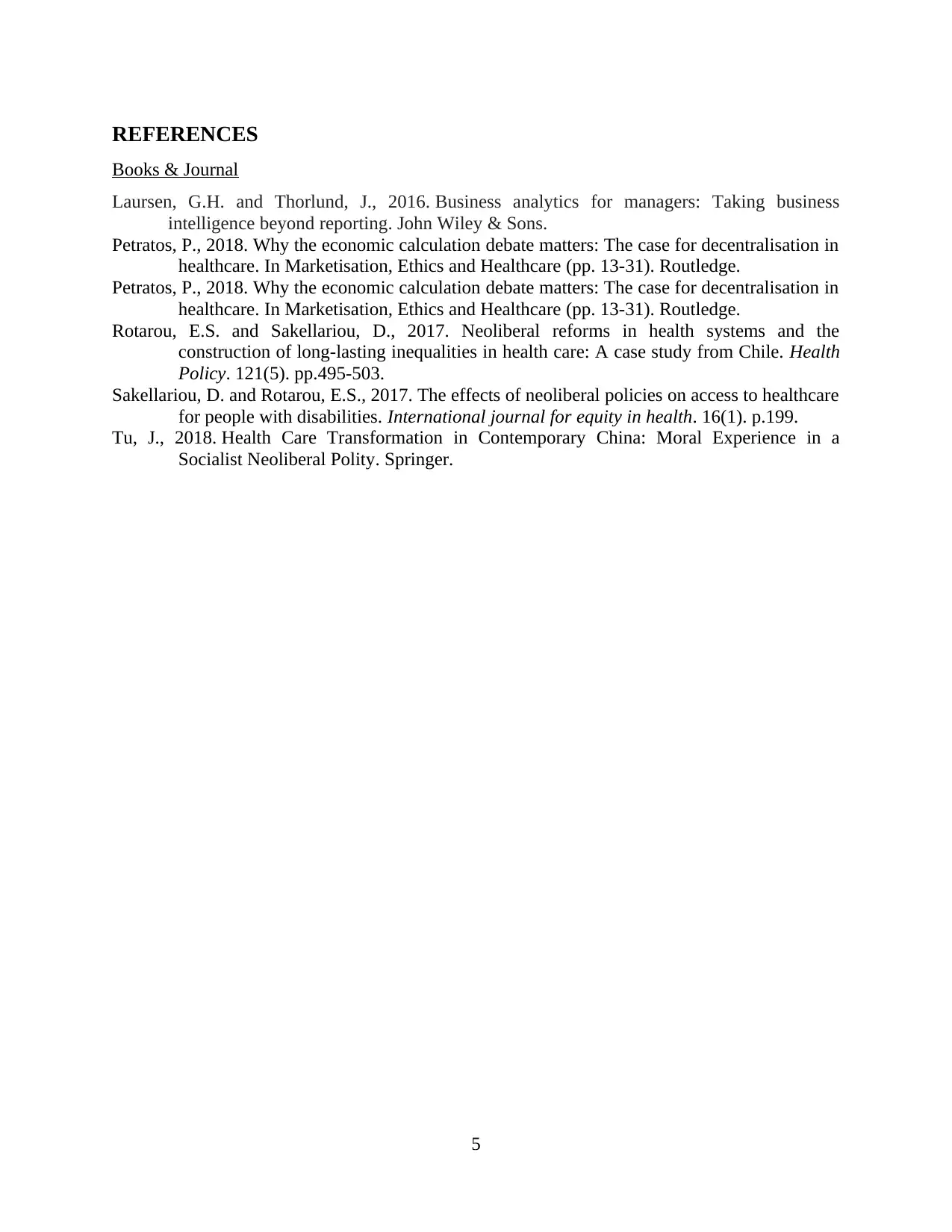
REFERENCES
Books & Journal
Laursen, G.H. and Thorlund, J., 2016. Business analytics for managers: Taking business
intelligence beyond reporting. John Wiley & Sons.
Petratos, P., 2018. Why the economic calculation debate matters: The case for decentralisation in
healthcare. In Marketisation, Ethics and Healthcare (pp. 13-31). Routledge.
Petratos, P., 2018. Why the economic calculation debate matters: The case for decentralisation in
healthcare. In Marketisation, Ethics and Healthcare (pp. 13-31). Routledge.
Rotarou, E.S. and Sakellariou, D., 2017. Neoliberal reforms in health systems and the
construction of long-lasting inequalities in health care: A case study from Chile. Health
Policy. 121(5). pp.495-503.
Sakellariou, D. and Rotarou, E.S., 2017. The effects of neoliberal policies on access to healthcare
for people with disabilities. International journal for equity in health. 16(1). p.199.
Tu, J., 2018. Health Care Transformation in Contemporary China: Moral Experience in a
Socialist Neoliberal Polity. Springer.
5
Books & Journal
Laursen, G.H. and Thorlund, J., 2016. Business analytics for managers: Taking business
intelligence beyond reporting. John Wiley & Sons.
Petratos, P., 2018. Why the economic calculation debate matters: The case for decentralisation in
healthcare. In Marketisation, Ethics and Healthcare (pp. 13-31). Routledge.
Petratos, P., 2018. Why the economic calculation debate matters: The case for decentralisation in
healthcare. In Marketisation, Ethics and Healthcare (pp. 13-31). Routledge.
Rotarou, E.S. and Sakellariou, D., 2017. Neoliberal reforms in health systems and the
construction of long-lasting inequalities in health care: A case study from Chile. Health
Policy. 121(5). pp.495-503.
Sakellariou, D. and Rotarou, E.S., 2017. The effects of neoliberal policies on access to healthcare
for people with disabilities. International journal for equity in health. 16(1). p.199.
Tu, J., 2018. Health Care Transformation in Contemporary China: Moral Experience in a
Socialist Neoliberal Polity. Springer.
5
Paraphrase This Document
Need a fresh take? Get an instant paraphrase of this document with our AI Paraphraser


1
1 out of 9
Related Documents
Your All-in-One AI-Powered Toolkit for Academic Success.
+13062052269
info@desklib.com
Available 24*7 on WhatsApp / Email
![[object Object]](/_next/static/media/star-bottom.7253800d.svg)
Unlock your academic potential
© 2024 | Zucol Services PVT LTD | All rights reserved.





